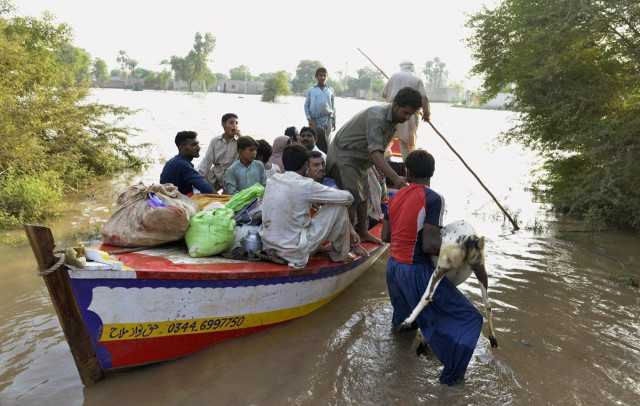Floods rage on
Floods are a national emergency that cannot be left only to the provinces to fend for themselves as best they can.

Floods rage on
A new phrase has entered the lexicon of misfortune — households which experience serial natural or man-made disasters are said to live in a ‘state of complex vulnerability’. The report sees an obvious linkage with poverty in terms of the worst affected households. Those dependent on the income of a daily wage or those households headed by women were the most vulnerable. Very few households that were affected by floods in Balochistan have recovered to the same levels of livelihood and food security as they had before being flooded. Households reported that they experienced greater difficulty in recovering if they were still recovering from an earlier inundation — a result that is hardly surprising but has serious long-term implications.
The pivotal event was the flood of 2010 which covered one-fifth of the total landmass of Pakistan. In parts of Sindh, the land had still not drained when the floods of 2011 and 2012 happened — and now the floods of 2014 are going to compound the effects of the previous three floods. Levels of household debt have risen as people borrow money to make up for lost income. Even middle-class families are badly affected, and they are the largest group now carrying additional debt.
Food insecurity was raised considerably post-flood, and only 15 per cent of those interviewed reported their consumption as ‘adequate’. Twenty per cent reported ‘poor’ consumption and 65 per cent ‘borderline. Most of the communities that took part in the survey are in the areas most likely to be affected by the 2014 floods. Around 500,000 residents of Jhang district are affected, and the city of Jhang has only been saved by making breaches in dykes that have themselves flooded more than 100 villages. In all about 1,100,000 people have been affected thus far and that number is going to rise as the floods roll southwards. More than 100,000 acres of farmland have been flooded around Jhang alone, and standing crops destroyed. The 2014 floods will eventually subside and recede from most places, but they will have added to the damage done in 2010, 2011, and 2012 and sapped still further the capacity of households and communities to recover. There are going to be floods of similar magnitude in years to come. This government is thus presented with a planning and management problem of surpassing magnitude and importance. Floods of this frequency and severity present a national threat to the security and stability of the nation, and are going to impact negatively on the nation’s ability to sustain itself in the short to medium term. The floods are a national emergency that cannot be left only to the provinces to fend for themselves as best they can. The army does its best — it always does in these situations — but it has real battles to fight elsewhere. The development and implementation of a national flood management and recovery strategy that is realistic and transcends petty politics has become of vital importance, and this government needs to devote appropriate resources to that end.
Published in The Express Tribune, September 12th, 2014.
Like Opinion & Editorial on Facebook, follow @ETOpEd on Twitter to receive all updates on all our daily pieces.
















COMMENTS
Comments are moderated and generally will be posted if they are on-topic and not abusive.
For more information, please see our Comments FAQ